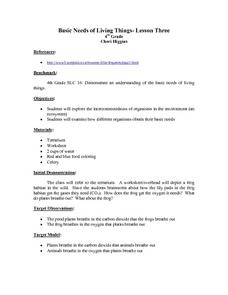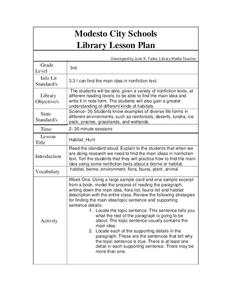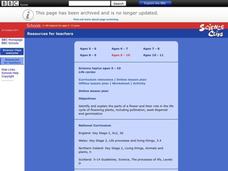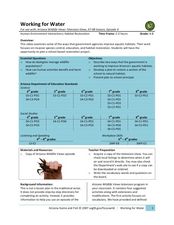Curated OER
Classify That!
Students get acquainted with diverse forms of life by using modern biological classification systems to group animals that are related. They explore basic scientific groupings like genus, species, mammals, fish, birds, amphibians, and...
Curated OER
Basic Needs of Living Things-Lesson Three
Fourth graders explore the interconnectedness of organisms in the environment and examine how different organisms obtain their basic needs. They discuss a frog's habitat and what is found in it. Students discuss the processes of...
Curated OER
Adaptations
Students identify what adaptation is and to research a specific mollusk. They also identify and interpret how animals get their common and scientific name and why it is Latin. Finally, students draw their shell (mollusk) and name their...
Curated OER
Habitat Hunt
Third graders read several nonfiction texts and practice finding the main idea for the text as well as learn about various habitats. In this main idea lesson, 3rd graders read several nonfiction texts and make habitat cards. Students...
Curated OER
Animal Games
Students explore a variety of games on the Internet that will teach them about animals; they focus on the Florida panther. Students choose the activity that is of interest to them, and then rotate between the games online and the games...
Alabama Learning Exchange
Is That a Whale?
Pupils research the characteristics and examples of the two main types of whales. They work in groups to study the habitats of each type of whale before developing a slideshow presentation of the information.
Curated OER
Life cycles
Students identify and explain the parts of a flower and their role in the life cycle of flowering plants, including pollination, seed dispersal and germination using the Internet. Students will also study and discuss the key points and...
Curated OER
Life Cycles
Students identify and explain the parts of a flower and their role in the life cycle of flowering plants. In this online plant biology lesson, students explore the processes of pollination, seed dispersal, and germination. Extension...
Curated OER
What If We Run Out?
Students explore the consequences of shrinking habitats and the human impact on wildlife populations. They participate in a game to study the consequences and describe the preservation of animal habitats.
Curated OER
Mini-Ecosystems
Third graders identify the living and non living things in a book read aloud and discuss the interactions represented in the book. Then, they research and include a list of food that each animal needs in an ecosystem. Finally, 3rd...
Curated OER
Big Cat Classification
First graders discover the different names and classifications of big cats by using word processing applications. In this animal life lesson plan, 1st graders investigate one big cat and create a database of facts about it using an word...
Curated OER
Prairie Ecology Internet Activity
In this prairie ecology worksheet, learners respond to 11 questions that require them to consult selected Internet sources and answer questions about prairie animals and their habitats.
Curated OER
Habitats and Adaptations
Students research and describe the habitat and adaptations of a reef animal. After the student is assigned a habitat, they design and draw a cresture adapted to eat each food and to live in each habitat.
Curated OER
Habitats
Students complete food chains for organisms in three environments. They use copies of the Habitat worksheet. Students review the food chain terms with the teacher. They research related food chains, and interlink these to form a food...
Curated OER
We All Live Together
First graders examine the lifestyle of classroom and family pets in their natural habitat. They determine the needs of plants and animals, and how those needs are met. They listen to read alouds, sing songs, and draw using computer based...
Curated OER
Helping plants grow well
Students explore the effect of water, temperature and light on plant growth. Students are asked if they remember the LAW for plants. This is Light, Air(temperature) and Water, which all plants need for growth. Students are divided...
University of South Carolina
Home Sweet Home
Fifth graders will research a biome (land or aquatic) and create a project (diorama, model or another idea of the student's choosing) which includes the geographic features of that biome as well as plants and animals found there and...
Curated OER
Students Solutions - Saving Our Surroundings
Pupils explore the environmental impact of humans on the plants and animals in their state. In this environmental impact lesson, students use digital cameras to photograph plants and animals in their state. Pupils investigate the animal...
Curated OER
Different Environments
Pupils read literature selection, discuss habitat, divide habitats into different categories such as water, soil, and land, list animals that live in each habitat, and describe habitats using descriptive words in vocabulary list.
Curated OER
Working for Water
Students examine the ways that government works to help improve aquatic habitats. In this water habitats lesson students view a video and plan a school restoration project.
Curated OER
A Natural Habitat: What, How and Why
Students understand what a habitat is. They determine why a habitat is important to our environment no matter where it is located. Students observe and recognize natural habitats in their surroundings.
Curated OER
What's That? A Habitat!
Students identify and define what oceans, deserts, woodlands, and cold places are. Then they identify animals that live in different habitats by playing a hands-on sorting activity. Students also research various web sites as instructed...
Curated OER
Biodiversity
In this biodiversity activity, students sort and classify animals by their observable features using a dichotomous key. Students then respond to questions about complete and incomplete metamorphosis.
Curated OER
Summer Camp in the Classroom
Students explore wildlife plants and summer activities. In this natural science lesson, students identify plants and animals and create a scrapbook of their findings.

























